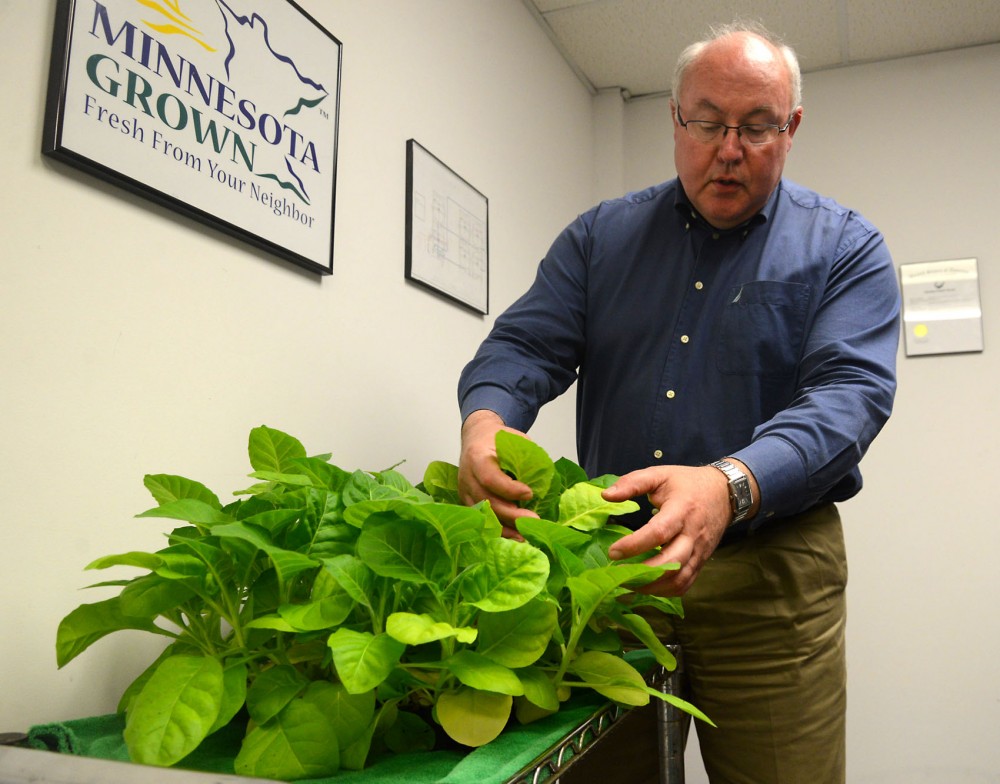Eight University of Minnesota students have been drawn to a project that aims to cure cancer.
They are motivated by their past experiences with the disease — each has watched a family member battle some form of cancer.
The students are part of a Carlson School of Management team, called the Founding Funders, that is campaigning for startup company MNPHARM to help fund a project that would grow individualized vaccines and cancer treatments. The company’s research uses tobacco plants to try developing new cancer treatments.
Some of the team members’ close ties to the disease have led them to help raise money and awareness for the business’s unusual approach to preventing cancer.
The students, brought together in their Entrepreneurship in Action class, were charged with a final assignment to create and run a successful business, said entrepreneurial and marketing senior and team member Alex Herrild.
The group chose to raise money for a startup, and after reviewing the missions of several Twin Cities-area companies they chose MNPHARM.
“We figured this would be a great cause that we could really be passionate about and get behind,” Herrild said.
The team began reaching out to students and faculty members in Carlson, as well as the local community, to raise funds for the company, Herrild said.
The group members share stories with prospective donors about relatives who had battled cancer — a method that has proved successful for garnering funds.
Herrild’s dad suffered from prostate cancer while Herrild was in high school.
“That was kind of a real experience,” he said. “You don’t ever think about it as much until someone you know and love gets it.”
Though his dad has been cancer-free for four years, Herrild said he recognizes his own risk and jumps on any sign of a new treatment.
Herrild’s teammate, entrepreneurial management and marketing senior Emerson Halbach, lost one aunt to bile duct cancer, and another is suffering from pancreatic cancer.
Halbach said the proximity of the Maplewood-based company allows him to watch their progress as the group helps funnel in donations.
“They’re entrepreneurs just like us,” he said. “Being in an entrepreneurship class and then meeting fellow entrepreneurs who are in the startup struggle, I think it was definitely a connection that we made.”
‘Poetic justice’
MNPHARM is not the first organization to use tobacco plants to help prevent cancer, but it’s working with new promising technology that could lead to a better outcome for the method, said the company’s co-founder Dave Roeser.
Their plants grow on an orbital garden — an indoor garden inside spinning cylinders — which allows the company to grow the plants 30 times faster than traditional methods, Roeser said.
University scientists are helping the company grow their tobacco plants. Once the plants are fully grown, researchers will infect them with bacteria and harvest the antibodies the plants make in response. The whole process would take just under one week to complete.
A doctor would administer the harvested antibodies to their patient, Roeser said.
The technology would also use cancer cells from individual patients to create treatments tailored to their disease, Roeser said.
A licensed treatment made from plant-based technology has yet to be made available to the public, said Dr. Mark Schleiss, co-director of the University’s Center for Infectious Diseases and Microbiology Translational Research.
But the technology is promising because the vaccines they hope to create would have a longer-than-average shelf life and are cheaper to produce than other vaccines, he said.
Tobacco is typically associated with harming humans, Schleiss said, but this method uses the plants to improve health.
“When we think about how tobacco has cost so many lives … over the centuries and still is a major cause of death in the world today,” Schleiss said, “it’s perhaps poetic justice in some sense if tobacco plants could be used for saving lives in the future.”
But researchers and MNPHARM officials aren’t sure how they would administer the vaccines yet, he said. Natural methods of immunization, like nasal sprays or edible medication, could prove better than injections.
MNPHARM’s plants should finish growing within the next month, Roeser said. At that point, the company hopes to begin growing a vaccine for the avian flu.
“That’ll affect not only the turkeys but people who need that protein in their diet,” Roeser said. “We’re really hitting at the right time to put all of these pieces together.”
Even though the company will begin testing the antibodies in cell cultures in the next few weeks, gaining federal approval from the FDA to test on animals and humans could take years, he said.
So far, the owners have been funding the company themselves, which is getting too expensive as the need for equipment increases, Roeser said.
MNPHARM’s relationship with the Carlson students has raised over $10,000 so far.
Roeser said he hopes to hire a few of the Carlson students full time to continue creating marketing strategies for the company long-term.








